Books
As an avid reader since I could, I loved the sight, the feel, the smell of books and the taste and sound of the words as I read silently or aloud.
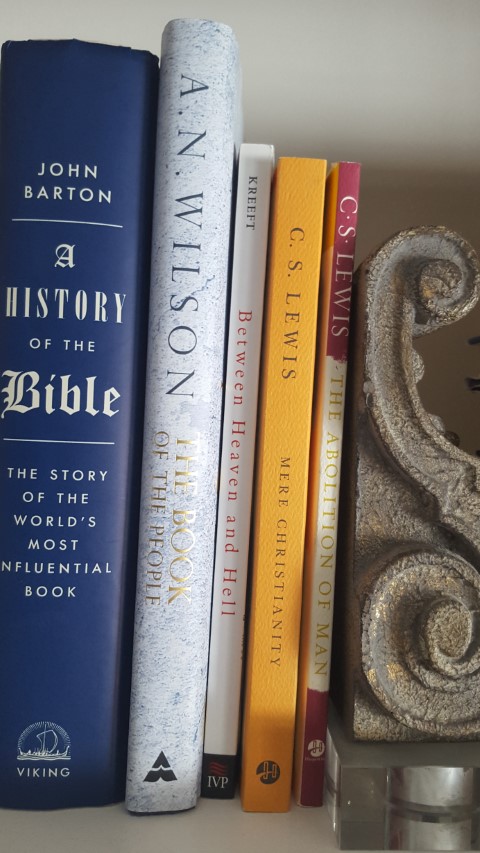
So I started to accumulate them, displaying them on brick-&-board shelves in temporary lodgings and graduating to custom-built bookshelves in our forever home. Books never go out of style in my philosophy of life, but trends come & go, and here we are again…
In style again. So I was not surprised when the trend came round again to bookshelves in the house. A lifestyle story in the Calgary Herald this spring explored ideas of how to handle our books when we downsize—what to keep, what to store and what to give away. Step 2 is how to organize the ones you keep and store, with options of bookshelves to fit smaller spaces.
The ultimate step, of course, is where do your books go when you die? To my grandchildren is my first choice—and two of the six have said they’d like to have them—but they all are still peripatetic in their young lives, and books need a place to stay. In the meantime…
Bookshelves. I live happily with bookshelves in almost every room. In 1971 when we moved in, our charming old house had built-in bookshelves in only two rooms: the living-room in a wall inserted to create an entrance hall, and in one bedroom with shelves under the eaves on either side of the dormer windows. My appetite for reading remained unabated—one winter when I was taking Italian every Saturday morning, I decided that reading Edward Gibbons’ The Decline and Fall of the Roman Empire would deepen the experience. And it did.—so we kept adding bookshelves, both built-in and free-standing, to house my growing collection of books.
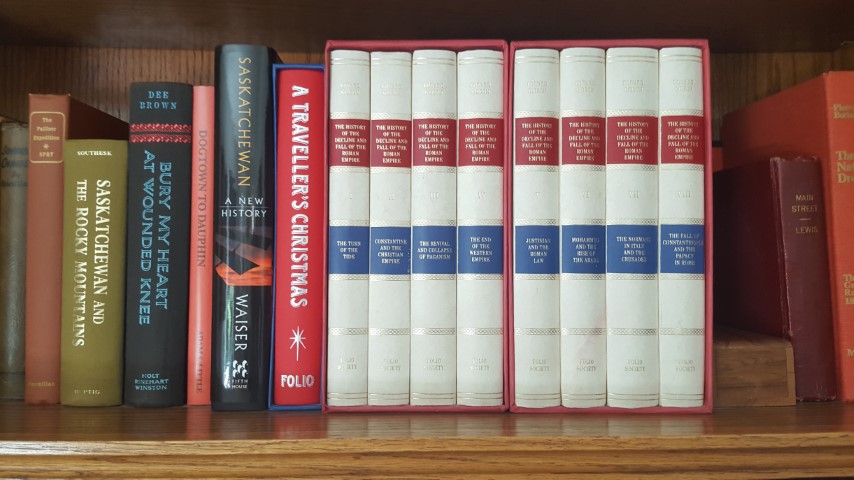
Folio edition of The Decline and Fall of the Roman Empire
Then in 1999, we did a major renovation and added custom bookshelves to the living room, den, kitchen and basement rumpus room. Handsome editions of classic books reside on the living-room shelves, while the den became the main library. The kitchen has cookbooks, of course, but also bowls & glasses & platters with a corner slot for our liquor ‘cabinet’. The basement has the 3-decade National Geographic collection and geologic textbooks and materials from J’s geology career.
Upstairs, novels from my university classes in English literature fill the bookshelves in the master bedroom, along with baby pictures of the grandkids. The guest room, before & after children, has two Ikea bookcases filled, two-deep on some shelves, with the ongoing stream of books piling up on their shelves. My office shelves are filled with dictionaries, style guides and piles of files of interesting & esoteric information.
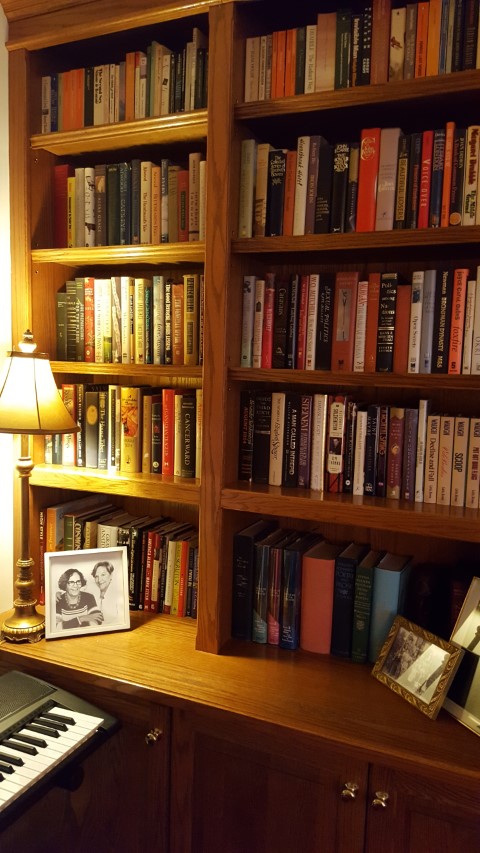
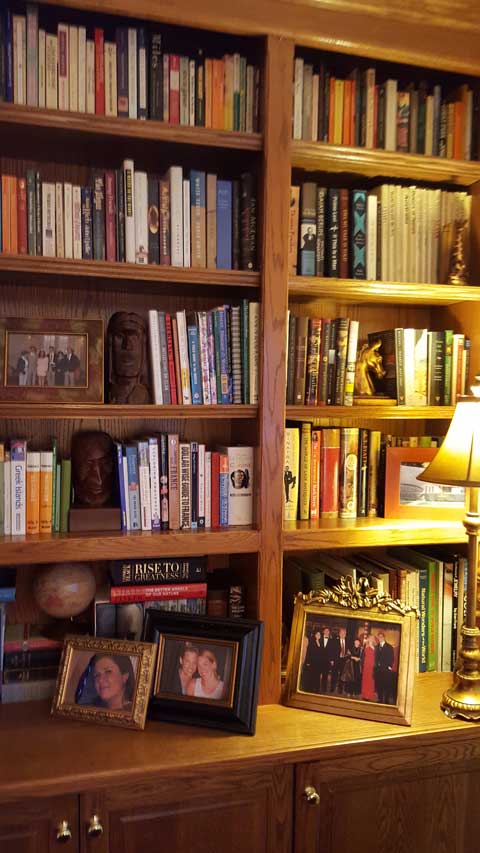
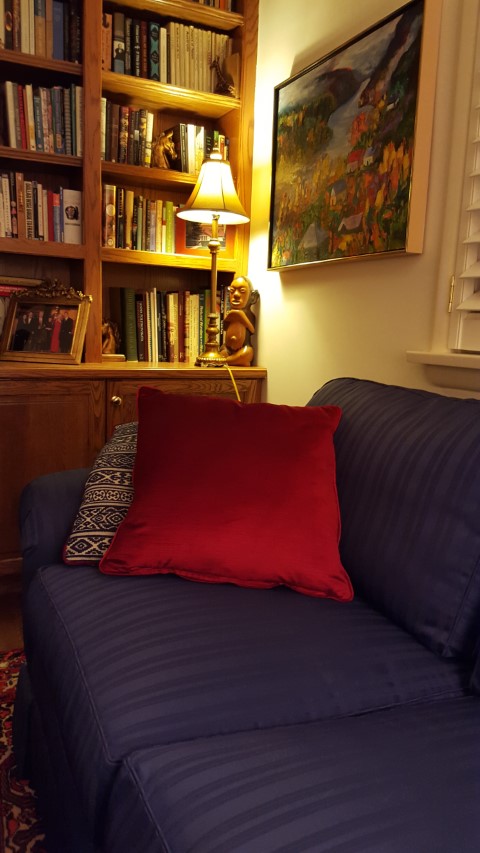
The heart of the matter. But books and bookshelves matter little if reading isn’t a part of your life. A couple months later, the Herald had a story on designing homes to include reading nooks & built-in bookshelves to encourage children to read: “Sometimes the mere presence of books on a shelf can inspire us to read,” says Stacey Pinney, founder of the 2023 Calgary Reads Big Book Sale. Sometimes they do, yes. But the crucial factor in encouraging children to read is seeing their parents reading. It’s the old adage of walking the walk, rather than just talking the talk.
Certainly, a home without books is a sterile environment for children—and adults!—but example trumps things. When friends asked, “How did you get your boys to read?” the answer was simple: Reading stories to them when they were little, and seeing their mother reading books & magazines & newspapers were a part of their everyday lives. When they complained that it was a chore to get their children to read anything beyond the bare necessities for school, I asked them, “Do you read?” The answer, “No, not much” decorated predictably with mundane excuses. If reading wasn’t part of your life, why on earth would you expect it to be part of your child’s life?
The sound of the human voice. Reading to my boys was a parental duty I loved beyond measure. To have the two of them snuggled up on each side of me was very heaven…a major reason I welcomed winter with its endless opportunities to do this. The feature of my childhood that dominates my memories is rainy afternoons in the summer house with sisters & brothers under the kerishena (a Ukrainian featherbed) totally absorbed in Pat of Silver Bush & Anne of Green Gables (by L.M. Montgomery), Huckleberry Finn & Tom Sawyer (by Mark Twain)…read to us by an older sister. I’d lose myself in the stories as my imagination took me to these other worlds far from life on a farm in Saskatchewan in the 1940s & ‘50s.
Nearly a century ago, Kari Jenson Gold wrote in First Things, “Children need to hear beautiful language if they are to speak and write beautifully.” Joshua Katz centres his argument for the spoken word on this sentiment (“Word of mouth,” The New Criterion, May 2023). Katz laments the de-emphasis of grammar and style in schools that has led to lamentable writing by so many under the age of 50.
Language is music, or should be. In almost every class I taught, I offered the same advice: read every word, every sentence, every paragraph you write aloud; pay attention to where something sounds off and where you stumble; rewrite those parts; and repeat, over and over, until it sings.
Like all beauty, which some dismiss as frivolous, the beauty of language rests firmly on its utility: To speak and write well is a universally admired characteristic that makes a life well lived, a first principle in the BMP file.
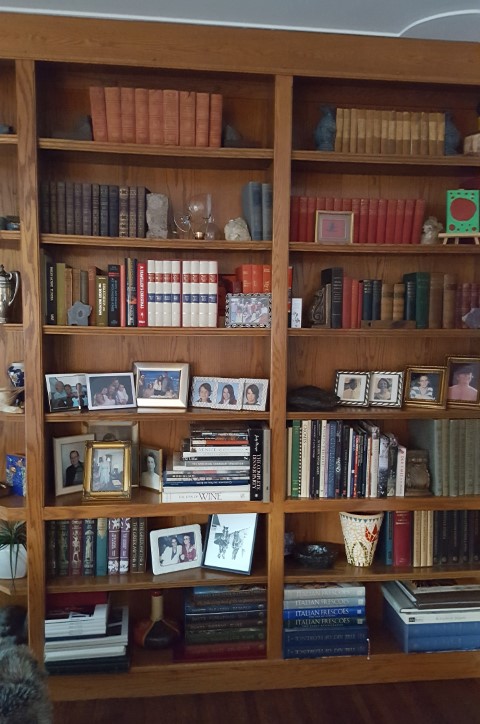
A particular book
The challenge for me now, in my old age, is to find fiction worthy of my time & attention. J and I have a running argument about which has the greater value: history or literature. While I think history is a must-read, especially one’s own culture for anyone serious about that culture, I have always given pride of place to literature—fiction that gives the reader insight into what it is to be human. Universal truths emerge only through the telling of individual stories peopled by characters based on the human family. Our individual lives are a continuous interior dialogue—from the joyful perspective, a hymn to the gift of life, and from the dismal perspective, one long suicide note.
So it’s a little miracle when I discover a writer—nearly always an old writer—who tells a real story, not a confected tale of me, me, me laced through with whine. Here we are in the safest, richest era in human history, and the drumbeat of complaint by our privileged brats in the West is deafening as they diligently work to tear down what their ancestors built. So I have learned to turn off the bestseller & award-winner highways of our postmodern world, and look for the stories along the local byways & global silk roads of civilization.
And I found How It Went by Wendell Berry, ‘stories (that) offer entry into the fictional place of value and beauty that is Port William, Kentucky’. Each of the 13 stories stands alone and is a chapter in the life of Andy Catlett and his small farming community.
Now, Port William, Kentucky, is very far from Pelly, Saskatchewan, where I grew up on a farm 5½ miles out of town. But the hard work, aloneness in lots of space, and joy in that environment brought it close to my childhood. And I don’t think you have to have grown up on a farm to ‘hear’ the authenticity of its story—the complexity of being human told with simplicity and grace. Reading a chapter each night before going to sleep was like talking to a friend.
With this discovery, I have a whole new shelf of books by Wendell Berry to read, among them Remembering: A Novel and Fidelity: Five Stories.
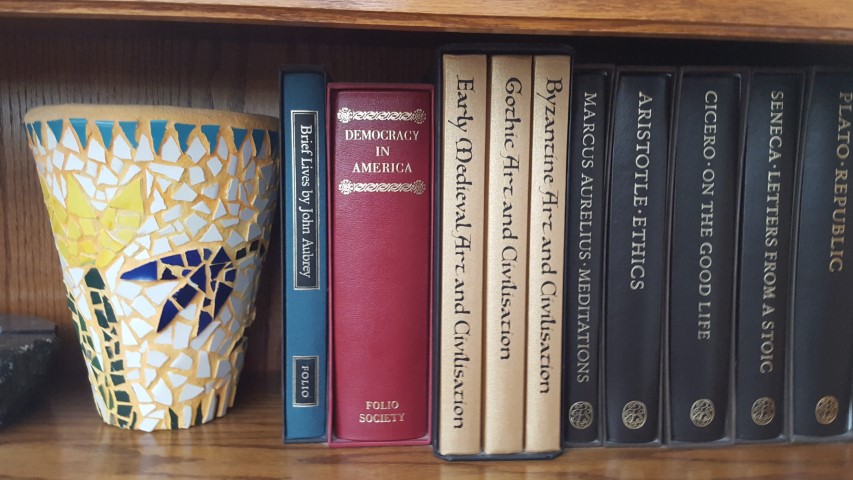
Exploring the sources of Western civilization
Family pictures
And nestled among all the books are family pictures, with the hallway gallery their principal showcase. Every day I walk through my family, upstairs & down, and contemplate the wonder of being a daughter/sister/aunt/mother & grandmother in a large & growing family. All of my brothers & sisters have now passed the ‘threescore years & ten’ milestone, with our children reaching retirement age and our grandchildren becoming adults. Our family gatherings are fewer and further between, but a burst of joy when, in diminishing numbers, we meet & greet each other—this summer at a memorial for a brother-in-law who had been wedded to my oldest sister for 65 years.
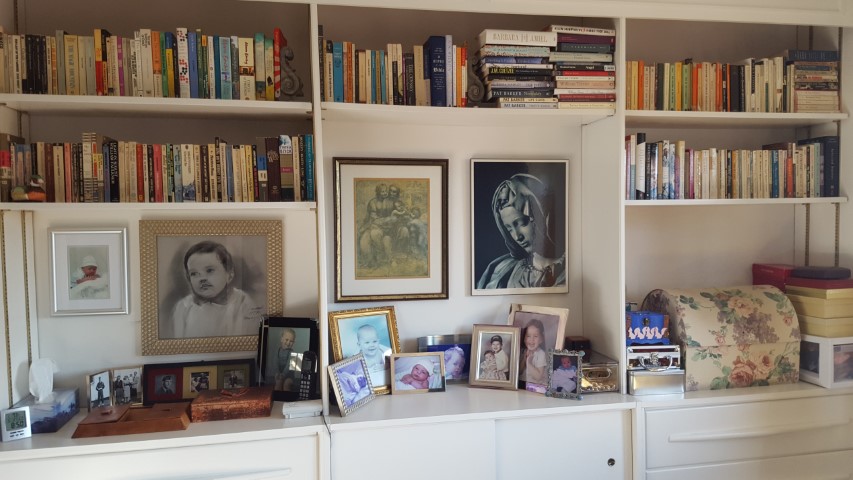
Books & babies
Books + family pictures = home
In this moment in history where the zeitgeist is to tear down our past and replace it with diversity, inclusion & equity—DIE, the killing fields of beauty & worth—I cling to books & family. The great writers plumb the depths & heights of what it is to be human, and the family unit underpins the Western ideal of individual freedom with its concomitant rights & responsibilities—an ideal that has not been surpassed in the history of humans on Planet Earth.
Now, back to Port William Novels & Stories: The Civil War to World War II…

a pleasure to read!
Thank you, Lori!